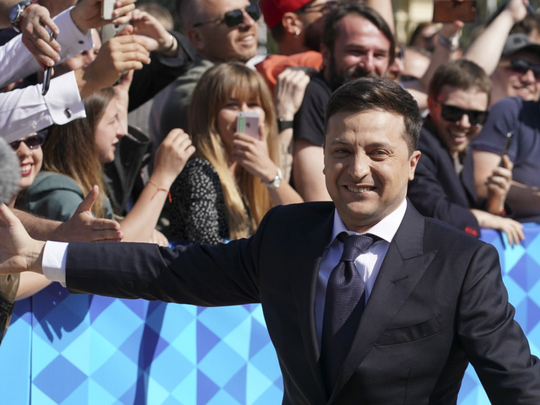
Ukraine’s comedian-turned-president, Volodymyr Zelenskiy, is finding out how determined the country’s elite is to prevent him from governing. He’s facing a rearguard action to stop him disbanding parliament and calling an early election his supporters stand to win (he has called for snap election).
Recently a key member of the country’s ruling coalition pulled out, creating months of chaos and legal wrangling to tie Zelenskiy’s hands.
This will be the first big test for the TV personality and anti-establishment rabble-rouser who beat Petro Poroshenko by a landslide last month. If Zelenskiy prevails, the different, non-nationalist, anti-corruption kind of populism that is emerging in eastern Europe can start to demonstrate its viability and, as likely as not, its limitations.
In Ukraine the president has considerable powers, particularly in security, defence and foreign policy, but parliament picks the prime minister and controls the key cabinet appointments. Without a majority in the legislature, he only has limited influence on the key areas of domestic policy that will determine the success or failure of his populist project. Zelenskiy, who ran an ingenious, innovative, social media-based campaign, has the same kind of momentum that allowed French President Emmanuel Macron to establish control of the parliament soon after his election.
Zelenskiy has demonstrated he can run strong campaigns and win elections. He has yet to prove his ability to govern and to pick incorruptible people for the job of dismantling Ukraine’s rotten establishment.
Like Macron, Zelenskiy is fielding a start-up party called Servant of the People after a television series in which he played a schoolteacher accidentally elected leader of Ukraine. The opinion polls, which were surprisingly accurate ahead of the presidential election, look promising. The group looks set to win about 30 per cent of the vote, a plurality. Zelenskiy’s chances of forming a governing coalition are strong.
He could squander this advantage, though, if he waited for the scheduled election on October 27. His best chance is to call an early vote. But Ukraine’s constitution only allows for that if the parliamentary parties fail to form a coalition for at least 30 days (and in two other, even less likely, scenarios) and certainly no later than six months before a scheduled election.
The Popular Front, which pulled out of the governing coalition on Friday, is trying to use these rules to keep parliament alive until its term expires. According to different interpretations of Ukrainian law, the cut-off date for dissolution is either May 27 or June 14, and both will pass before the 30-day deadline for coalition talks runs out.
The Popular Front, whose key supporters, include Interior Minister Arsen Avakov, has little to lose. Powerful before the election, it no longer registers in the polls. Its interest lies in giving loyalists a few more months in powerful and potentially lucrative offices as well as time to find a political bandwagon to jump on.
One could argue that the ruling coalition formed after the 2014 election fell apart in 2016, when two parties left it and Prime Minister Arseniy Yatsenyuk resigned. Since then, Volodymyr Hroisman’s cabinet has looked like a minority government: It has struggled to secure parliamentary majorities for its proposals.
Zelenskiy could demand that the coordinators of this coalition prove that it really exists by demanding a signed list of members’ names.
His team has been pushing for early elections, and various plans to that effect have been discussed internally. The question is whether Zelenskiy is prepared to play hardball and ignore the legislators’ attempts to foil him. A video posted on his Facebook page recently indicates he could. In it, he called on legislators to speed up their decision on his inauguration date (he has since assumed office) and stop clinging to their mandates.
Zelenskiy will be watched closely for signs of excessive loyalty to oligarch and business partner Igor Kolomoisky, who returned to Ukraine last week after he moved to Israel amid allegations the businessman plundered the bank he owned and which Ukraine later nationalised.
Zelenskiy has demonstrated he can run strong campaigns and win elections. He has yet to prove his ability to govern and to pick incorruptible people for the job of dismantling Ukraine’s rotten establishment, all while Russian President Vladimir Putin maintains military and economic pressure on Kiev.
The president won’t be able to face these tests until late fall unless he plucks up the courage to move against the recalcitrant parliament.
— Bloomberg
Leonid Bershidsky is a noted columnist covering European politics.









